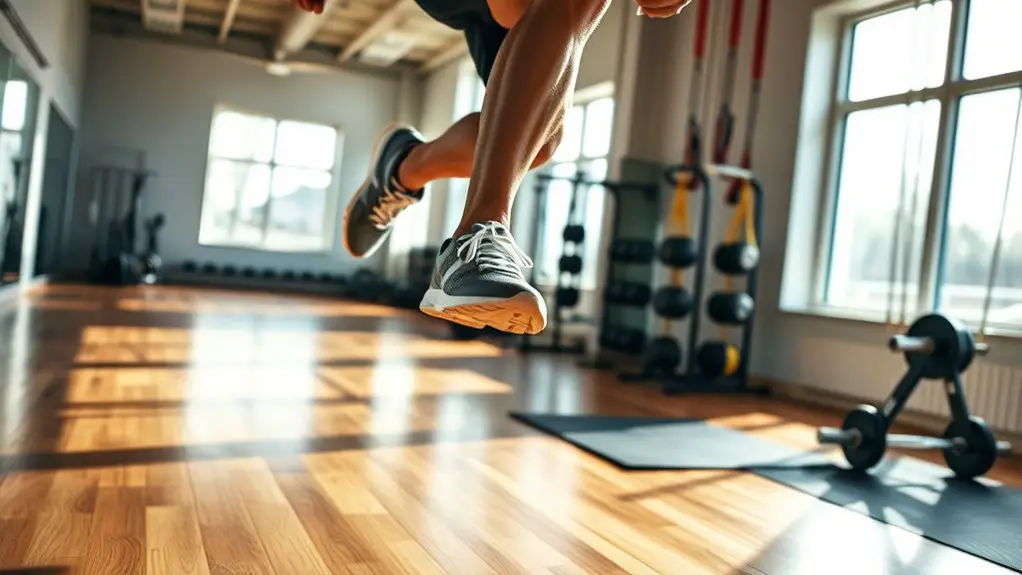Strength training is essential for improving your explosive tackles and blocking in football. It targets key muscle groups like your legs, core, and upper body, enhancing power and stability. Incorporating exercises such as squats, deadlifts, and plyometric drills will boost your speed and agility on the field. Regularly monitoring your progress and adjusting workout intensity will keep you at peak performance. Stick around to discover how to create the perfect training program tailored to your needs.
Understanding the Importance of Strength Training in Football
Understanding the significance of strength training in football is crucial for any player looking to excel on the field. When you focus on building your strength, you reveal a world of benefits that can elevate your football performance. Stronger muscles not only improve your speed and agility but also enhance your ability to tackle effectively and withstand impacts. You'll notice that with increased strength, you can push through defenders and maintain control during plays.
Moreover, strength training fosters confidence. When you know you've put in the work in the gym, you're more likely to take calculated risks during games. This freedom to play without hesitation can set you apart from the competition. Embracing a strength training regimen will help you dominate on the field, ensuring you're not just participating but thriving in the game you love. So, harness those strength benefits and watch your football performance soar! Additionally, incorporating squats and deadlifts into your workout routine can significantly enhance your explosive strength, further benefiting your tackling and blocking abilities.
Key Muscle Groups for Tackling and Blocking
When it comes to tackling and blocking in football, certain muscle groups play a vital role in your performance. You can't overlook your legs, especially the quads, hamstrings, and calves. Strong legs provide the explosive power necessary for effective tackling techniques and blocking strategies. Your core muscles are equally important, as they stabilize your body and enable quick directional changes. Don't forget about your upper body; the shoulders, chest, and arms are essential for delivering strong hits and maintaining leverage during blocks. Building these muscle groups not only enhances your strength but also reduces the risk of injury. Incorporating strength training exercises into your routine can significantly improve your overall performance on the field.
Essential Exercises for Explosive Power
To maximize your tackling and blocking performance, incorporating essential exercises for explosive power is crucial. Focus on explosive lifts like the clean and jerk or snatch. These movements recruit multiple muscle groups, enhancing your overall strength and explosiveness. Aim for low-rep, high-weight sets to develop raw power.
Integrate power drills into your routine, such as medicine ball throws and kettlebell swings. These drills mimic the explosive movements you'll face on the field, boosting your ability to generate force quickly.
Don't forget about compound exercises like squats and deadlifts; they establish a strong foundation for your explosive lifts while engaging your core and stabilizers. Additionally, proper technique is vital for maximizing explosive power and minimizing injury risk during these movements.
Plyometric Training for Speed and Agility
Explosive power lays the groundwork for speed and agility, which are essential for effective tackling and blocking. Plyometric training is key to revealing your potential on the field. Incorporating plyometric drills like box jumps and depth jumps can greatly enhance your explosive movements. These exercises develop the fast-twitch muscle fibers needed for quick bursts of speed.
Agility ladders are another fantastic tool to improve your footwork and coordination. By practicing different ladder drills, you'll sharpen your reaction time and increase your lateral quickness, both crucial for outmaneuvering opponents. Additionally, plyometric exercises increase overall performance on the field by enhancing coordination and balance.
To get the most out of your training, aim for a combination of these drills. Not only will you boost your athletic performance, but you'll also feel the freedom of movement that comes with enhanced speed and agility. So, embrace the challenge and integrate plyometric exercises into your routine for a more dynamic game!
The Role of Core Strength in Tackling Efficiency
While many might focus solely on leg strength for tackling, core strength plays an equally vital role in your effectiveness on the field. A strong core enhances your core stability, allowing you to maintain balance and control during tackles. When you engage your core, you transmit power from your legs through your torso, increasing your tackling force. Rotational strength is also essential; it enables you to twist and turn efficiently, letting you adjust your body position for maximum impact. Without a strong core, you risk losing control and power, making you less effective in those explosive moments. Developing your core strength not only enhances movement efficiency but also helps to prevent injuries, ensuring you can perform at your best on the field.
Implementing Resistance Training for Maximum Impact
When you incorporate resistance training into your routine, you'll greatly enhance your tackling and blocking abilities on the field. Using resistance bands is a game-changer, allowing you to perform explosive movements that build strength and speed. Additionally, resistance bands promote improved flexibility, which is crucial for maintaining a competitive edge. Here's a simple way to implement resistance training:
| Exercise | Focus Area |
|---|---|
| Band Resisted Sprints | Speed & Agility |
| Band Squats | Leg Power & Stability |
| Band Lateral Walks | Hip Strength |
Injury Prevention Through Proper Strength Training
Incorporating resistance training not only boosts your tackling and blocking skills but also plays an important role in injury prevention. By strengthening your muscles, ligaments, and joints, you create a solid foundation that can better absorb impacts and reduce the risk of injuries. It's vital to prioritize warm-up routines before every session—these prepare your body for the physical demands of the game and enhance your overall performance.
Additionally, engaging in weight-bearing exercises helps improve your bone health, which is essential for preventing fractures during high-impact activities. Don't forget that proper strength training can aid in injury recovery too. If you've faced setbacks in the past, targeted exercises can help you regain strength and stability, allowing you to return to the field with confidence. Stay consistent with your training regimen, and listen to your body's signals. Embracing these practices not only keeps you in the game longer but also empowers you to play freely and fearlessly, knowing you're minimizing your risk of injury.
Creating a Balanced Strength Training Program
To create a balanced strength training program, you need to focus on core strength development and incorporate compound movements. These elements not only enhance your stability but also improve overall power and efficiency on the field. By prioritizing these areas, you'll set yourself up for success in tackling and blocking. Additionally, incorporating multi-joint exercises will better mimic the demands of your sport and enhance your functional strength.
Core Strength Development
Core strength is essential for tackles and blocking, providing stability and power during play. You need to focus on developing core stability and rotational strength to enhance your performance on the field. Incorporate exercises like planks, Russian twists, and medicine ball throws to engage your entire core. These movements not only build strength but also improve your agility and balance, enabling you to change direction quickly when needed.
Don't forget to mix in dynamic movements that mimic game situations. This approach will help you translate your workouts into real-life scenarios, allowing you to feel more confident and in control during tackles and blocks. With a solid core, you'll release your potential and play with freedom and ferocity.
Compound Movement Focus
While focusing on compound movements is essential for a balanced strength training program, you'll find that these exercises effectively target multiple muscle groups at once. Compound exercises like squats, deadlifts, and bench presses mimic natural movement patterns, giving you the freedom to develop strength that translates directly to the field. By engaging various muscle groups, you not only save time but also improve coordination and stability. Incorporating these movements into your routine guarantees your body learns to work as a unit, essential for explosive tackles and blocking. As you build strength through these compound exercises, you'll enhance your overall athletic performance, allowing you to release your full potential during gameplay. Embrace the power of compound movements for a well-rounded approach.
Monitoring Progress and Adjusting Your Training Plan
Monitoring your progress is key to ensuring your strength training is effective. By tracking your strength gains, you can see what's working and what needs adjustment. Don't hesitate to modify your workout intensity based on these insights to keep pushing your limits. Additionally, incorporating proper nutrition strategies can significantly enhance your recovery and overall performance.
Tracking Strength Gains
Tracking your strength gains is essential for optimizing your training plan and ensuring you're making progress toward your goals. By implementing effective tracking techniques, you can pinpoint what works best for you. Start with regular strength assessments to gauge your performance over time. This could involve measuring your maximum lifts, monitoring your endurance in reps, or even using performance metrics during drills. Keeping a training journal or utilizing apps can simplify this process, allowing you to visualize your growth. Remember, it's about finding what resonates with you and adjusting your approach accordingly. By staying attuned to your progress, you'll not only enhance your performance but also maintain the freedom to adapt your training as needed.
Modifying Workout Intensity
After evaluating your strength gains, the next step is to adjust your workout intensity to guarantee continued progress. You've got the freedom to explore various workout modifications that keep your training fresh and effective. Start by incorporating intensity adjustments, like increasing weights or reducing rest periods. Listen to your body; if you're feeling fatigued, consider lighter sessions or alternative exercises to prevent burnout. Track your progress regularly, and don't hesitate to alter your plan based on how you feel. The key is to keep challenging yourself without overdoing it. By customizing your workouts, you'll stay motivated and engaged, ultimately enhancing your tackling and blocking skills. Keep pushing forward—your hard work will pay off!
Frequently Asked Questions
How Often Should I Train for Optimal Tackling Performance?
Think of your tackling performance like a finely tuned engine – it needs regular maintenance to run smoothly. To achieve ideal tackling frequency, you should train several times a week, balancing intensity with recovery. Focus on high-intensity sessions that challenge your skills, but don't forget to allow your body to rest and adapt. This freedom to push limits while respecting your needs will keep your performance sharp and explosive on the field.
Can Strength Training Help Prevent Concussions in Football?
Strength training can indeed play a role in concussion prevention. By building a stronger neck and shoulder area, you're better equipped to absorb impacts and reduce the risk of injury. When your body's stronger, you've got more control during collisions, which helps protect your head. So, incorporating strength training into your routine not only enhances performance but can also contribute to keeping you safer on the field. It's all about smart training choices!
What Dietary Changes Support Strength Training for Football?
To support your strength training for football, focus on macronutrient balance. You'll want to include ample protein for muscle repair, carbs for energy, and healthy fats for overall health. Don't forget hydration strategies—staying well-hydrated can enhance your performance and recovery. By making these dietary changes, you'll not only fuel your workouts but also enjoy the freedom of feeling strong and capable on the field. Embrace this journey to maximize your potential!
How Do I Balance Strength Training With On-Field Practice?
Balancing strength training with on-field practice is essential for your development. You'll want to create training schedules that allow for adequate recovery while maximizing your performance. Incorporate on-field drills into your routine, ensuring they complement your strength workouts. Don't forget to listen to your body; if you're feeling fatigued, adjust your sessions. With the right balance, you can enjoy the freedom to excel in both areas without burning out.
What Supplements Enhance Explosive Strength for Tackling and Blocking?
When you're looking to boost explosive strength, consider adding creatine to your regimen; it's known for enhancing power and performance. You might also explore beta-alanine supplementation, which can help reduce fatigue during intense activities. These supplements can give you that extra edge, allowing you to feel more liberated and capable during your workouts. Just remember to pair them with a balanced diet and proper training for the best results.




